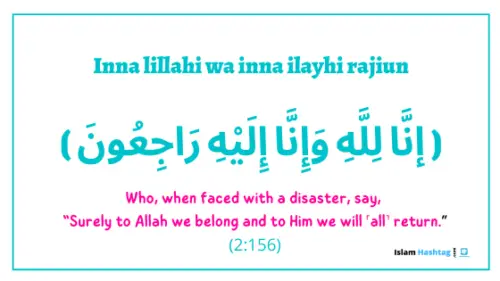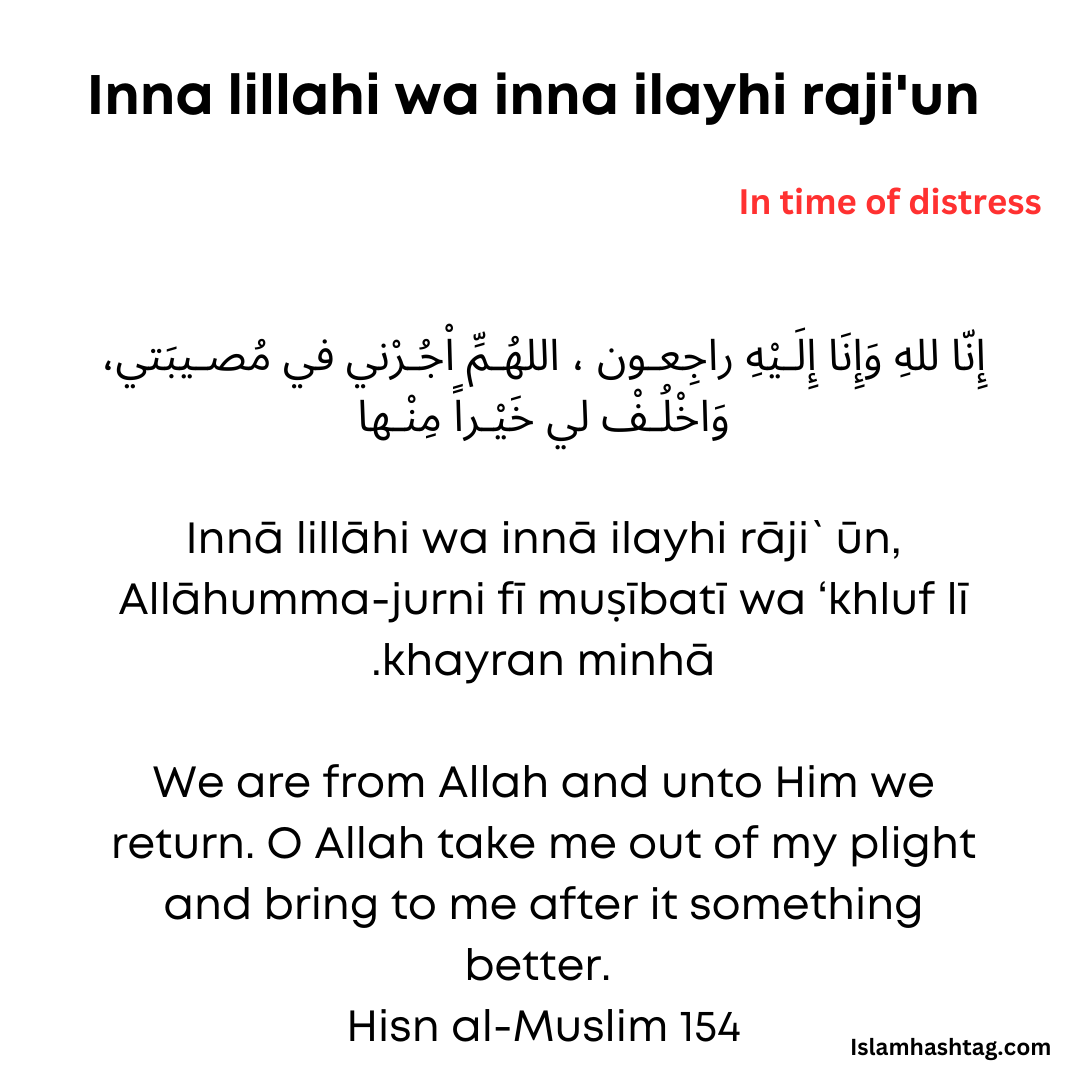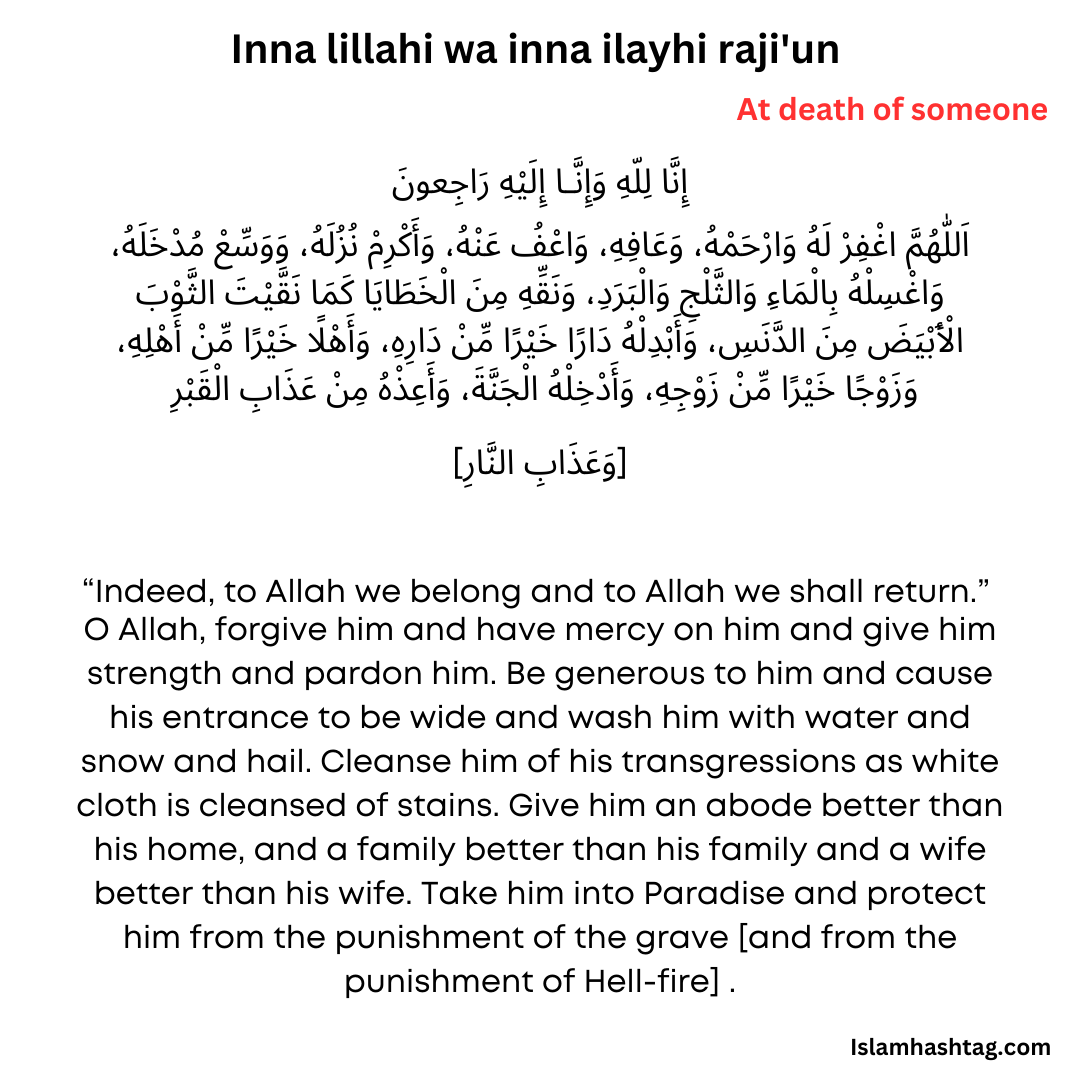“Inna lillahi wa inna ilayhi raji’un”/ Istirja.
( إنَّا لِلَّهِ وَإِنَّا إِلَيْهِ رَاجِعُونَ): We usually say Inna lillahi wa Inna ilayhi raji’un at the death of a person. Do you know that we can say this ayah at any hardship? Nabi sallalahu alaihe wa sallam used to say this whenever he suffered any hardship.
inna lillahi wa inna ilayhi raji’un ( إنَّا لِلَّهِ وَإِنَّا إِلَيْهِ رَاجِعُونَ ) is also called istirja.
inna lillahi wa inna ilayhi raji’un meaning
It means “Surely to Allah we belong and to Him we will all return.“
| Inna: | Meaning Truly, Indeed, surely, verily ‘we’ |
| Lillahi: | We belong to Allah |
| Wa Inna: | Wa means ‘and’; Inna means ‘indeed |
| Ilayhi: | means ‘towards Him’ |
| RajiOon: | means ‘Return’ |
Reference of Inna lillahi wa Inna ilayhi raji’un in Quran
It is Allah’s command in Quran

Who, when faced with a disaster, say, “Surely to Allah we belong and to Him we will ˹all˺ return.”(2:156)
ٱلَّذِينَ إِذَآ أَصَـٰبَتْهُم مُّصِيبَةٌ قَالُوٓا۟ إِنَّا لِلَّهِ وَإِنَّآ إِلَيْهِ رَٰجِعُونَ
Who, when faced with a disaster, say, “Surely to Allah we belong and to Him we will ˹all˺ return.”(2:156)
‘Saying does not signify the mere making of a statement. It means a statement which is accompanied by a deep conviction in one’s heart: ‘To Allah do we belong.’
This being so, a man is bound to think that whatever has been sacrificed for God has in fact attained its legitimate end, for it has been spent in the way of the One to whom all things truly belong. And it is to Him that we are destined to return’ refers to the fact that man will not stay forever in this world and will return, sooner or later, to God.
Allah says in the next ayah: (2:157) Upon them will be the blessings and mercy of their Lord, and it is they who are rightly guided.
The Sunnah of Istirjaa: 4 Occasions when Prophet Muhammad (Sallalahu alaihe wa sallam ) said Inna lillahi
There are four commentaries of Museebat, during which Rasulullah ﷺ resorted to patience and recited
اِنَا لِلّٰهِ وَاِنَا اِلَيْهِ رَاجِعُوْنَ.
Rasulullah ﷺ has taught the Ummah that even during the slightest difficulty one should read,
اِنَا لِلّٰهِ وَاِنَا اِلَيْهِ رَاجِعُوْن.
In short, Allah Ta’ala is inviting us to attain His special proximity. How will this be attained?The author of Rooh ul Ma’aani writes that Rasulullah ﷺ read اِنَا لِلّٰهِ وَاِنَا اِلَيْهِ رَاجِعُوْن on the following four occasions,
- “When pricked by a thorn.”
- “On being bitten by a mosquito.”
We are being taught by Rasulullah ﷺ that even on the slightest of inconveniences, the reward is phenomenal.
Upon a minor act, a major reward is attained. Resort to reciting, اِنَا لِلّٰهِ وَاِنَا اِلَيْهِ رَاجِعُوْن and reap the reward of Allah’s closeness, His togetherness. He did not read the above softly but read it audibly so that the Sahabah heard it. The hearing of the Sahabah is proof enough that it was recited audibly. As is the case when an individual asked Hazrat Abdullah ibn-e-Mas’ood (RadiAllahu Anhu) whether Rasulullah ﷺ recited the Khutbah in a standing or sitting position.
In response, he asked the person whether he had read the Aayah, وَتَرَكُوْكَقَا ءِمَا that Rasulullah ﷺ was standing while delivering the Khutbah when a caravan of camels arrived bearing their load of wheat on which occasion some Sahabah left him and departed. From this we deduce that he was standing and delivering the Khutbah.
In the Ayah, وَتَرَكُوْكَقَا ءِمَا – قَاءِ مَا is the Haal (condition) and the Haal is bound by the verb, denoting that they left his presence while he was standing. Similar is the case of the Sahabah hearing our beloved Rasul ﷺ reciting اِنَا لِلّٰه.
- “When a lamp suddenly became extinguished.”
In our day and age, if ever the lights happen to cut out, we too can act upon this Sunnah, by reciting اِنَا لِلّٰهِ وَاِنَا اِلَيْهِ رَاجِعُوْن. Though the age of lamps has passed, we are nonetheless still able to act upon the Sunnah. On one occasion, when the lights went off, the Khalifah of Hakeem ul Ummah Hazrat Thanwi Saheb (Rahmatullah Alaihi), Hazrat Dr. Abdul Hayy Saheb (Rahmatullah Alaihi) beautifully said, “Though the lights have cut out, the light imbued by Allah is still in the heart.”
The fourth occasion was,
- “When the strap of the sandal broke.”
These are the four occasions on which Rasulullah ﷺ recited اِنَا لِلّٰهِ وَاِنَا اِلَيْهِ رَاجِعُوْن.
This is taken from the kitaab: Patience and the Position of the Siddiqeen – Hadhrat Maulana Hakeem Muhammad Akhtar Sahib رحمه اللّٰه
When to say Inna lillahi wa inna ilayhi rajeun
- Whenever we suffer hardship
Nabi sallalahu alaihe wa sallam used to say this whenever he suffered any hardship.We can say “Inna lillahi wa Inna ilayhi raji’un” even when our sandal breaks
Bayhaqi is shaubul iman says , also mentioned in Mishkat:Abu Huraira reported God’s messenger as saying, “When the thong of someone’s sandal breaks he should say, ‘We belong to God and to Him do we return,’ for it is one of the calamities.”
عَنْ أَبِي هُرَيْرَةَ رَضِيَ اللَّهُ عَنْهُ قَالَ: قَالَ رَسُولُ اللَّهِ صَلَّى اللَّهُ عَلَيْهِ وَسَلَّمَ: «إِذَا انْقَطَعَ شِسْعُ أَحَدِكُمْ فَلْيَسْتَرْجِعْ فَإِنَّهُ مِنَ المصائب» . رَوَاهُ الْبَيْهَقِيّ فِي شعب الْإِيمَان
- Saying Inna lillahi wa Inna ilayhi raji’un as Condolence at death of a Muslim
It is mustahab (desirable) to condole with the family of the dead in words like these; “May Allah forgive and have mercy on the dead! May He overlook his lapses! May he cause you all to endure the severe tragedy patiently and may He reward you all against this grief and affliction.”
- Remembering a hardship
Sayyiduna Husayn ibn Ali radi allahu anhu narrated that the Prophet sallalahu alaihe wa sallam said,a Muslim man or woman suffers a hardship and recalls it, even after a long period of time and says:(We belong to Allah and to Him is our return). Allah, Blessed and Exalted, renews a reward whenever it is said like the reward for it on the day he was afflicted (mishkat 1759)
وَعَنِ الْحُسَيْنِ بْنِ عَلِيٍّ عَنِ النَّبِيِّ صَلَّى اللَّهُ عَلَيْهِ وَسَلَّمَ قَالَ: «مَا مِنْ مُسْلِمٍ وَلَا مُسْلِمَةٍ يُصَابُ بِمُصِيبَةٍ فَيَذْكُرُهَا وَإِنْ طَالَ عَهْدُهَا فَيُحْدِثُ لِذَلِكَ اسْتِرْجَاعًا إِلَّا جَدَّدَ اللَّهُ تَبَارَكَ وَتَعَالَى لَهُ عِنْدَ ذَلِكَ فَأَعْطَاهُ مِثْلَ أَجْرِهَا يَوْمَ أُصِيبَ بِهَا» . رَوَاهُ أَحْمَدُ وَالْبَيْهَقِيُّ فِي شعب الْإِيمَان
- Allah renews the reward of affliction
Sayyiduna Husayn ibn Ali radi allahu anhu narrated that the Prophet sallalahu alaihe wa sallam said,a Muslim man or woman suffers a hardship and recalls it, even after a long period of time and says:(We belong to Allah and to Him is our return). Allah, Blessed and Exalted, renews a reward whenever it is said like the reward for it on the day he was afflicted (mishkat 1759)
وَعَنِ الْحُسَيْنِ بْنِ عَلِيٍّ عَنِ النَّبِيِّ صَلَّى اللَّهُ عَلَيْهِ وَسَلَّمَ قَالَ: «مَا مِنْ مُسْلِمٍ وَلَا مُسْلِمَةٍ يُصَابُ بِمُصِيبَةٍ فَيَذْكُرُهَا وَإِنْ طَالَ عَهْدُهَا فَيُحْدِثُ لِذَلِكَ اسْتِرْجَاعًا إِلَّا جَدَّدَ اللَّهُ تَبَارَكَ وَتَعَالَى لَهُ عِنْدَ ذَلِكَ فَأَعْطَاهُ مِثْلَ أَجْرِهَا يَوْمَ أُصِيبَ بِهَا» . رَوَاهُ أَحْمَدُ وَالْبَيْهَقِيُّ فِي شعب الْإِيمَان
- It is a Dua, Hadith of Umm salama on Inna lillahi wa Inna ilayhi raji’un
إِنّا للهِ وَإِنَا إِلَـيْهِ راجِعـون ، اللهُـمِّ اْجُـرْني في مُصـيبَتي، وَاخْلُـفْ لي خَيْـراً مِنْـها

Innā lillāhi wa innā ilayhi rāji`ūn, Allāhumma-jurni fī muṣībatī wa ‘khluf lī khayran minhā.
We are from Allah and unto Him we return. O Allah take me out of my plight and bring to me after it something better. Hisn al-Muslim 154
Narrated Umm Salamah:The Messenger of Allah (ﷺ) as saying: When one of you is afflicted with a calamity, he should say:
{ إِنَّا لِلَّهِ وَإِنَّا إِلَيْهِ رَاجِعُونَ } اللَّهُمَّ عِنْدَكَ أَحْتَسِبُ مُصِيبَتِي فَآجِرْنِي فِيهَا وَأَبْدِلْ لِي خَيْرًا مِنْهَا ” .
“We belong to Allah, and to Him we do return.” O Allah, I expect reward from Thee from this affliction, so give me reward for it, and give me a better compensation. Sunan Abi Dawud 3119
It was narrated from Umm Salamah that Abu Salamah told her that he heard the Messenger of Allah (ﷺ) say:“There is no Muslim who is stricken with a calamity and reacts by saying as Allah has commanded: ‘Inna lillahi, wa inna ilayhi raji’un. Allahumma indaka ahtasabtu musibati, fajurni fiha, wa ‘awwidni minha (Truly, to Allah we belong and truly, to Him we shall return. O Allah, with You I seek reward for my calamity, so reward me for it and compensate me),’ but Allah will reward him for that and compensate him with something better than it.”
She said: “When Abu Salamah died, I remembered what he had told me from the Messenger of Allah (ﷺ) and I said: ‘Inna lillahi, wa inna ilayhi raji’un. Allahumma indaka ahtasabtu musibati, fajurni alaiha (Truly, to Allah we belong and truly, to Him we shall return.
O Allah, with You I seek reward for my calamity, so reward me for it).’ But when I wanted to say wa ‘awwidni minha (and compensate me with better), I said to myself: ‘How can I be compensated with something better than Abu Salamah?’ Then I said it, and Allah compensated me with Muhammad (ﷺ) and rewarded me for my calamity.”
إِنَّا لِلَّهِ وَإِنَّا إِلَيْهِ رَاجِعُونَ اللَّهُمَّ عِنْدَكَ احْتَسَبْتُ مُصِيبَتِي فَأْجُرْنِي فِيهَا وَعُضْنِي مِنْهَا – إِلاَّ آجَرَهُ اللَّهُ عَلَيْهَا وَعَاضَهُ خَيْرًا مِنْهَا ” .
When the time of death was near Abu Salamah, he said: ‘O Allah, replace me for my wife, with better than me.” So when he died, Umm Salamah said: “Indeed, to Allah we belong and to Him we shall return. I seek reward with Allah for my affliction, so reward me for it.”Jami` at-Tirmidhi 3511


“Inna lillahi wa inna ilayhi raji’un” at the death of a person

what to say after inna lillahi wa inna ilayhi raji’un?
O Allah, forgive him and have mercy on him and give him strength and pardon him. Be generous to him and cause his entrance to be wide and wash him with water and snow and hail. Cleanse him of his transgressions as white cloth is cleansed of stains. Give him an abode better than his home, and a family better than his family, and a wife better than his wife. Take him into Paradise and protect him from the punishment of the grave [and from the punishment of Hell-fire].
إِنَّا لِلّهِ وَإِنَّـا إِلَيْهِ رَاجِعونَ
اللَّهُمَّ اغْفِرْ له وَارْحَمْهُ وَعَافِهِ وَاعْفُ عَنْهُ، وَأَكْرِمْ نُزُلَهُ، وَوَسِّعْ مُدْخَلَهُ، وَاغْسِلْهُ بِالْمَاءِ وَالثَّلْجِ وَالْبَرَدِ، وَنَقِّهِ مِنْ الْخَطَايَا كَمَا نَقَّيْتَ الثَّوْبَ الْأَبْيَضَ مِنْ الدَّنَسِ، وَأَبْدِلْهُ دَارًا خَيْرًا مِنْ دَارِهِ، وَأَهْلًا خَيْرًا مِنْ أَهْلِهِ، وَأَدْخِلْهُ الْجَنة، وَقِهِ فِتْنَةَ الْقَبْرِ وَعَذَابَ النَّارِ واجمعنا مع من سبقونا من احبابنا بالفردوس الاعلى من الجنة بغير حساب ولا
Reference in Quran
It is Allah’s command in Quran

Who, when faced with a disaster, say, “Surely to Allah we belong and to Him we will ˹all˺ return.”(2:156)
ٱلَّذِينَ إِذَآ أَصَـٰبَتْهُم مُّصِيبَةٌ قَالُوٓا۟ إِنَّا لِلَّهِ وَإِنَّآ إِلَيْهِ رَٰجِعُونَ
Who, when faced with a disaster, say, “Surely to Allah we belong and to Him we will ˹all˺ return.”(2:156)
‘Saying does not signify the mere making of a statement. It means a statement which is accompanied by a deep conviction in one’s heart: ‘To Allah do we belong.’ This being so, a man is bound to think that whatever has been sacrificed for God has in fact attained its legitimate end, for it has been spent in the way of the One to whom all things truly belong. And it is to Him that we are destined to return’ refers to the fact that man will not stay forever in this world and will return, sooner or later, to God.
Allah says in the next ayah: (2:157) Upon them will be the blessings and mercy of their Lord, and it is they who are rightly guided.
Is Inna lillahi wa Inna ilayhi raji’un a dua from Quran ?
yes, It comes in Quran (2:156)
Allah says in Quran,
ٱلَّذِينَ إِذَآ أَصَـٰبَتْهُم مُّصِيبَةٌ قَالُوٓا۟ إِنَّا لِلَّهِ وَإِنَّآ إِلَيْهِ رَٰجِعُونَ
In Quran 2:156. “: ٱلَّذِينَ إِذَ أَصَابَتْهُم مُّصِيبَةٌۭ قَالُوا۟ إِنَّا لِلَّٰهِ وَإِنَّ إِلَيْهِ رَاجِعُونَ, ’Those who, when an affliction visits them, say, ‘Verily we belong to Allah, and verily to Him do we return.””
This brings deep conviction in one’s heart: ‘To Allah do we belong.’ This being so, a man is bound to think that whatever has been sacrificed for God has in fact attained its legitimate end, for it has been spent in the way of the One to whom all things truly belong. ‘And it is to Him that we are destined to return’ refers to the fact that man will not stay forever in this world and will return, sooner or later, to Allah.






SubhanAllah!! Jazak Allahu khair giving a full explanation of this du’a. So many mistakenly believe it is only to be said only upon the death of someone.
This Dua is very importance in human life …Thanks for this sharing content
Inna lillahi wa inna ilayhi raji’un is the great post kindly add some Quran Surah Referance